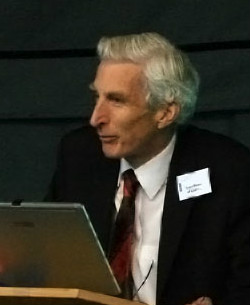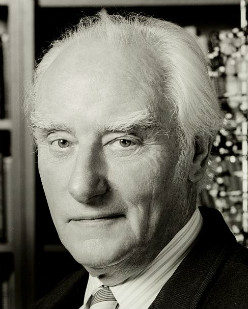Cosmic Flukes and Hunches
Did life arise by a massive fluke or are we here by design? The answer to that question has massive implications for all of life
I could barely contain my incredulity when I read Lord Rees' article in the Daily Telegraph of January 8th. Writing about the possibility of life on the recently 'discovered' Earth-like planet Kepler 438b at a distance of 475 light years, the Astronomer Royal, writes:
 'We know how simple life evolved into our present biosphere. But we don't know how the first life was generated from a "soup" of chemicals. It might have involved a fluke so rare that it happened only once in the entire galaxy - like shuffling a whole pack of cards into a perfect order. On the other hand, this crucial transition might have been almost inevitable given the "right" environment.'
'We know how simple life evolved into our present biosphere. But we don't know how the first life was generated from a "soup" of chemicals. It might have involved a fluke so rare that it happened only once in the entire galaxy - like shuffling a whole pack of cards into a perfect order. On the other hand, this crucial transition might have been almost inevitable given the "right" environment.'
I think we might reasonably expect something more logical and coherent from such a distinguished scientist. Is a 'fluke' the best the scientific community can come up with for the origin of life? Francis Crick's suggestion that it would take a 'miracle' is significantly better[1]. His work on elucidating the complex chemical and informational structure of DNA must have given him a clear understanding of just how big a 'fluke' it would need to have been, though his suggestion of 'panspermia' - that life came from elsewhere is the universe - fails to really solve the basic problem.
Lord Rees' second suggestion about the inevitability of the origin of life borders on the inscrutable. What exactly, or even inexactly, makes it 'inevitable'? And, in addition, it always leaves the uncomfortable feeling that if we don't know how life began, how can we possibly assert confidently that we know how it evolved into our present biosphere?
 Perhaps I shouldn't have been surprised by the fluke theory. In another article dealing with the origin of the universe and the possibility of a multiverse - another dubious way of avoiding the obvious challenge of explaining the 'fine-tuning' of the universe for life - Lord Rees concedes that the multiverse theory is no more than a 'hunch'[2], though in a later book he upgrades it to a 'tentative hypothesis'[3].
Perhaps I shouldn't have been surprised by the fluke theory. In another article dealing with the origin of the universe and the possibility of a multiverse - another dubious way of avoiding the obvious challenge of explaining the 'fine-tuning' of the universe for life - Lord Rees concedes that the multiverse theory is no more than a 'hunch'[2], though in a later book he upgrades it to a 'tentative hypothesis'[3].
I remain mystified at how 'flukes' and 'hunches' have gained such acceptance by the scientific community when a much simpler and more intuitive possibility exists. Why not design?
 Design in any system is easily recognised from the specified and purposeful arrangement of its component parts. What we know, for example, about cosmic fine-tuning, biological complexity and the enormous information content of DNA makes design a far more likely explanation. It is telling that both Richard Dawkins[4] and Bill Gates[5] recognise the computer-like nature of DNA, the latter noting that 'DNA is like a computer programme but far, far more advanced than any software ever created'. I think the design inference is blindingly obvious. It's not just apparent6 as Dawkins contends - it has to be real, as real as the output of Microsoft's programmers.
Design in any system is easily recognised from the specified and purposeful arrangement of its component parts. What we know, for example, about cosmic fine-tuning, biological complexity and the enormous information content of DNA makes design a far more likely explanation. It is telling that both Richard Dawkins[4] and Bill Gates[5] recognise the computer-like nature of DNA, the latter noting that 'DNA is like a computer programme but far, far more advanced than any software ever created'. I think the design inference is blindingly obvious. It's not just apparent6 as Dawkins contends - it has to be real, as real as the output of Microsoft's programmers.
Clearly, the philosophical and religious implications of design are profound. But they should not blind us to the obvious scientific data which points to an intelligent cause which lies beyond the purely material. And that's the nub of the problem. Science has now been high-jacked by philosophical materialism to the extent that an intelligent cause is effectively ruled out before the evidence is considered. Nonetheless, every physical entity requires some explanation for its existence, leading us either to the illogicality of an infinite regression or to a defining, designing, sufficient first cause.
 The general public and the business sector who pay, through their taxes and sponsorship, for much of the work of the scientific community deserve better explanations than 'flukes' and 'hunches'.
The general public and the business sector who pay, through their taxes and sponsorship, for much of the work of the scientific community deserve better explanations than 'flukes' and 'hunches'.
It is not as if it doesn't matter. If there is even the possibility that we live in a designed universe, it is important for all of us to know that and to think through the consequences. We should at least be free to discuss the subject dispassionately.
That's why we campaign for the freedom to engage in academic and public discussion of intelligent design and its implications. Given the strength of evidence for design in nature, it shouldn't be too much to ask.
Dr Alastair Noble
Director of the Centre for Intelligent Design UK
February 2015
[1] Crick, Life Itself, p88
[2] Rees, Our Cosmic Habitat, London: Phoenix, 2003, p164
[3] Martin Rees, Just Six Numbers, p167
[4] Dawkins, River out of Eden, p17
[5] Gates, The Road Ahead, 188
[6] Dawkins, The Blind Watchmaker, p1
Image credits:
Thumbnail - from Eduard Riou (1838-1900) "The World Before the Deluge", 1872. This work is, therefore, in the public domain.
Lord Rees - extracted from an image on Wikimedia Commons
Sir Francis Crick - extracted from an image on Wikimedia Commons Cells - courtesy pixabay.com CC0 licence
Writing chemical formula - licence to use held by C4ID